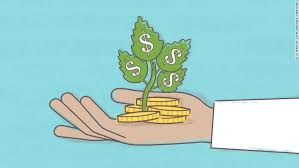How to shop without harming people or the planet

Want to shop with a clear conscience this holiday season and not sure how to do it?
Spending money on products and services that match your values can be tricky if you don’t have the time — or inclination — to do huge amounts of research each time you go shopping.
There’s a lot at stake. After all, Americans spend $ 36 billion each day, said Andrei Cherny, a former speechwriter for Vice President Al Gore and co-founder of Aspiration — an investment firm that aims to make it much easier to spend on products and services you trust.
“People want to think about how they can use their money to make a positive impact, but often they don’t have the information to make those decisions,” said Cherny, who has also worked as a financial fraud prosecutor.
Aspiration was launched in 2014 and so far has raised $ 20 million in investment, including some from impact investors who target a social or environmental return as well as a profit.
Related: These super-rich families are investing their fortunes to help others
It has developed an app and online checking account that gives customers a personalized sustainability score based on their spending habits.
Helping people and the planet
When you use the account to make a purchase, Aspiration shows you two scores for the vendor: a “people score” based on employee pay and workforce diversity, and a “planet score” that takes into account factors such as emissions and energy efficiency. It also shows you scores for similar businesses.
Aspiration analyzes information about thousands of companies. It’s also working on ways to track customer behavior, to see whether they change their spending habits in response to their sustainability score.
One company has already found plenty of evidence that shoppers will make different choices when presented with social and environmental product rankings.
“People are interested in voting with their dollars, and supporting companies that share their values,” said Alexander Gillett, chief executive of HowGood, which ranks the sustainability of food products by assessing 60 to 70 data points covering everything from chemical usage to labor practices.
Related: 6 ways to make an impact investment
According to Gillett, products that receive HowGood’s top ranking see an average uplift in sales of 230%. This can, in turn, encourage producers to shift towards a more sustainable business model to boost their ranking.
howgood food ratings
HowGood ranks the sustainability of food products by assessing 60 to 70 data points.
Gillett and his brother Arthur founded HowGood in 2007. They spent five years working with experts from across the food industry to develop their rankings — good, better and best — which can be displayed alongside products on supermarket shelves.
HowGood rates more than 250,000 products, and its ratings are on display in grocers across the U.S., including Giant Food. HowGood hopes to bring its ratings to online shoppers soon.
Impact shopping needn’t cost more
Shopping sustainably doesn’t necessarily mean spending more.
“There’s a myth that you have to go somewhere fancy for sustainability,” said Cherny. “Even within categories, there are differences. Pizza Hut does better than Papa John’s. McDonald’s does better than Burger King.”
Related: Investors cash in by keeping convicts out of jail
Like Aspiration, HowGood has its sights set on expanding beyond the U.S. Impact investors and others have so far committed $ 6.2 million to the company, which has plans to branch out beyond food.
“We want to rate every product in the world ultimately, but we want to rate them well,” Gillett said.
LendingTree
